- Home
- Steve Hockensmith
Holmes on the Range Page 19
Holmes on the Range Read online
Page 19
Or, A Sleuth Is Reborn from the Ashes
Alright, Amlingmeyer,” Brackwell snapped the moment I’d closed the office door behind us. “What is it you have to say?” His tone was both resigned and angry, and he looked ready to stalk right back out of the room the moment Gustav finished his first “I’m sorry.”
“Well, I suppose I oughta. . .,” Old Red began, each word coming out quieter than the one before it. His gaze dropped, and I could hardly believe I was witnessing the day when my brother couldn’t look another man in the eye. He sniffed loudly, and I figured he was about to start weeping on top of everything else.
As mortifying as such a sight might be, I couldn’t really blame Old Red for squeezing out a few tears. He’d tried turning maverick, but now he had to accept that he’d been branded for life.
Cowboy, the brand said.
Laborer.
Nobody.
“Yes? Go on,” Brackwell demanded.
Rather than explain, Old Red dropped to his hands and knees.
For a second there, I thought he was going to wrap his arms around Brackwell’s ankles and beg for forgiveness. But my brother had something very different in mind. He let out a low whistle and started crawling toward the fireplace at one end of the room.
Brackwell and I gaped at him, goggle-eyed.
“Hel-lo! Someone’s sure been busy here,” Gustav said, combing through heaps of gray ash under and around the grate. “Ol’ General Sherman himself couldn’t have done more with a match.” He pushed his nose in so close to the cinders it’s a wonder he didn’t dust his mustache gray. “Fresh,” he said, sucking in a whiff. “The fire died out not more than seven, eight hours ago.”
“Amlingmeyer. . . what are you doing?” Brackwell asked, sounding more perplexed than peeved.
“Detectin’!” Old Red replied. He began picking small bits of singed paper from the fireplace and depositing them gently in his left hand.
“You ain’t quittin’?” I said.
“Quittin’? Brother, you know me better than that. I ain’t gonna ‘concede’ squat to that blustery old son of a bitch.”
“And you ain’t all broken up that Mr. Holmes is dead?” I asked, strangely pleased that my brother wasn’t pulling our necks from the Duke’s noose after all.
“Oh, I ain’t happy to hear someone say it,” Gustav said, still sifting ash. “But sounds to me like they didn’t find a body, and you know what Mr. Holmes himself says about jumpin’ to conclusions. It wouldn’t surprise me if he’s just takin’ a nice, long holiday somewhere, lettin’ the folks back home assume what they will.”
I was so tickled Old Red wasn’t turning tail I didn’t bother pointing out how childish this wishful thinking was. If believing the great detective was alive kept Gustav’s spirits out of the dirt, I wasn’t going to argue against it, no matter how silly the notion might be.
“You might just be right,” I said.
“I try to make a habit of it,” Old Red replied. “I apologize if I threw a scare into you, Mr. Brackwell. I needed to figure a way in here, and givin’ the Duke what he wanted seemed like the quickest way to go.”
Brackwell had already brought out a grin that made him look almost as relieved as I felt. “Appearing to acquiesce to the Duke while doing as you please is a sound strategy. His children have been doing it for years.”
“Is that a fact?” Gustav muttered, taking the remark with a gravity it didn’t seem to warrant. “So tell me, Mr. Brackwell—you have any idea who lit up a bonfire in here last night?”
“I haven’t the foggiest.”
“I didn’t suppose you would. It couldn’t be that easy.” Old Red swiveled around and moved to Perkins’s desk, walking on his knees with a small pile of burnt paper in his hands. “You fellers havin’ more of an eye for words and such, I’ll let you look this over.”
He spread the char-edged scraps on the desk.
“And what exactly are we looking for?” Brackwell asked.
Gustav cocked an eyebrow at me.
“The paper Boudreaux took out of the cellar yesterday?” I said.
My brother flashed me a here-and-gone smile. Then he dropped onto his belly and took to crawling around the room like a baby, his nose no more than three inches from the floor. Brackwell and I couldn’t help but stare at him a moment.
“I’m sorry—I still don’t understand what we’re looking for,” the Englishman said when we finally turned to the task at hand.
“All I know is it’s a piece of paper,” I had to admit. “And it’s important . . .for some reason.”
Brackwell gave the scraps before us a dismissive shrug. On most of them, blocky, typeset lettering was still visible.
“Well, I don’t see anything important here. Just a shredded newspaper—used as kindling, I expect.”
“Yeah,” I said, sifting through the singed paper. “There ain’t nothin’ here that. . .hold on!”
One of the scraps was different from the rest. It was charred up good, but there was enough left—a circle a little smaller than a man’s palm—to see that it wasn’t from a newspaper. It was blank.
When I flipped the paper over, I found scratchy, blurred writing on the other side. Most of the words had disappeared into the fire, but a few letters and numbers remained:
ill of Sal
nnuery 20, 1893
tallo
00—payed
cfersin
klin Dammers
“ ‘Bill of Sale,’ ” I said after I’d read everything out for Old Red. “It’s a receipt. And it ain’t hard to figure out it’s made out to McPherson, even if this Dammers feller couldn’t spell worth a damn.”
“That’d be Franklin Dammers, manager of the Diamond 8 Ranch in Wyoming,” Old Red said from the floor. “Now why do you think Uly’d go all the way down there just to buy tallow? That ain’t nothin’ but animal fat, and he could boil down all he needed from cows here.”
I shrugged. “Lord knows he didn’t use it to make soap. Until the Duke’s bunch came along, I don’t think he’d even heard of the stuff.”
“I’m sorry,” Brackwell said. “I’m quite confused. Could one of you please—”
“Well, hel-lo there, stranger!” Old Red called out. He plucked something off the Turkish rug that covered about a quarter of the office floor. He turned to show it to us, displaying the little ditty proudly, like a boy holding up a foot-long trout he’s just pulled from the river.
It was a tiny bit of scorched fluff—another feather, just like the one Gustav had found pasted to the hole in Boudreaux’s head.
“I knew it,” I said. “We got us a killer chicken on the loose.”
“I’m afraid I’m not following this at all,” Brackwell said, looking so bewildered by now he was almost woozy.
“Don’t worry,” I told him. “I ain’t really followin’ it myself.”
Old Red was too busy—and in too good a mood—to chastise me for my foolishness. He was running his fingers over a round depression in the rug near where he’d come across that feather. The fabric had been worn away or crushed by some friction or heavy weight.
“This is it,” Gustav announced.
Not far from the dimple in the carpet was a twin. Each spot was about two inches across, and they were separated from each other by another foot and a half.
You didn’t have to look far to see what had made the marks. An ottoman was pressed up against the wall nearby, and the distance between the legs perfectly matched the distance between those indentations.
Old Red looked up at me.
“Would you be so kind?” he said, seeing that I’d added things up as he had.
I gave the ottoman a push, sliding it just enough so the legs covered those grooves in the carpet—grooves they had themselves created by resting in the same place for months if not years. Gustav squirmed around my feet to see what the ottoman had been moved to conceal. There was no need for him to get up so close, however, for the stains in the rug were plain enough f
rom where Brackwell and I stood.
“Surely that’s not—” the Englishman began.
“Oh, but it is,” Old Red said. “That’s blood. Last night y’all hosted a murder in this house, and you didn’t even know it.”
“Here? In the. . .?” Brackwell shook his head as if he could decline this disturbing news with a polite “No thanks.” “I don’t understand. The noise I heard didn’t sound like a gunshot.”
“Gunshots can be muffled—especially from a little gun like a der-ringer.” Gustav hopped to his feet and hustled toward the other side of the room. “Anyway, don’t you worry about understandin’ it all.” He pulled back the drapes and peeked out the window toward the bunkhouses and the corral. “That’s my job.”
My brother had been delivering one surprise after another that day, so you might think my capacity for astonishment would have dropped dead from exhaustion by now. But it proved to be in good working order still, for I found my eyes again popping and my jaw again dropping when Old Red slid that window open and climbed on through.
“Well, I found what I aimed to—and then some,” he said once he had his feet planted outside. “I reckon the Duke’s gonna come bustin’ through the door any second now, so we can’t dawdle. I’m gonna be gone for a few minutes. Otto, until I get back, I need you to do what you do best.”
“What’s that?”
“Talk—and don’t forget to listen while you’re at it, cuz it’s what Mr. Brackwell has to say in reply that I’m interested in.”
“Talk about what?”
“Edwards, mostly. And how he ties in with the Duke. And the Sussex Land and Cattle Company. And Lady Clara.”
“What’s there to say? Edwards is another la-di-da fool with too much money, that’s how he ties in with the Duke’s crowd.” I turned and gave Brackwell an apologetic nod. “Not meanin’ any disrespect to yourself or the lady, of course.”
Brackwell nodded back, a slight, rather distracted-looking smile creasing his thin lips. “Of course.”
“I suspect there’s a good bit more to say about the man than you think, Brother,” Old Red said, taking a quick peek over his shoulder. When he was sure no one was behind him getting a bead on his back, he continued, “Edwards seems a tad out of place amongst highborn English folks like the Duke and Clara and Mr. Brackwell here, don’t he? Yet the old man treats him like a bosom pal—almost like family, you might say. I’d like to hear the why of it.”
“Maybe he won the Duke over with his sparklin’ personality and natural warmth,” I suggested.
Gustav rolled his eyes.
“No, Otto,” Brackwell said, some weary despair weighing down his words. When I looked over at him, I found him shaking his head sorrowfully. “It’s Edwards’s substantial bank account that has endeared him to the Duke. And his ambition. I know what your brother’s asking about. I can tell you all about it.”
“Alright, if you say so.” I swiveled around to face the window again. “So, Gustav—what’ll you be. . .?”
There was no point finishing the question. There was no one there to hear it.
Old Red was gone.
Twenty-eight
CONNECTIONS
Or, I Learn More About a Certain “Noble Bachelor”—and Two Not-So-Noble Ones
Your brother is an extraordinary man,” Brackwell said. “So’s Hungry Bob Tracy, but you won’t hear his family braggin’ on it,” I replied, though the crack came more from habit than my heart. “Now what’s this about Edwards and the Duke and Clara and what all?”
Brackwell took a seat on the ottoman and stared down at his clasped hands.
“It’s something I’d normally prefer not to discuss. You must understand—Lady Clara is a dear friend. I’ve known her practically all my life. Her brothers and mine, they’re cut from the same cloth. Their father’s sons, I suppose. But Lady Clara and I have always been different. I almost think of her as. . .an older sister. I don’t wish to betray any confidences or traffic in spiteful gossip.”
I sympathized with his tender feelings toward the lady, of course. But either Old Red or the old man were going to come barging back into the room any second, and I didn’t wish to face either one without getting the answers my brother wanted first.
“I’m sorry, Mr. Brackwell—we don’t have much time. Whatever you got to say, you need to go on and say it,” I prodded as gently as I could. “Tell you what. Why don’t you start with Edwards? I bet you wouldn’t mind bandyin’ about some spiteful gossip he’s attached to.”
“Oh, there’s an ample supply of that,” Brackwell spat with a vehemence that caught me by surprise. “As much as he puts on airs, he’ll never be accepted as a true gentleman. Not when all of respectable society knows how his family made its fortune.”
“Which was how?”
Brackwell grinned bitterly. “Are you familiar with something called Dr. Edwards’s Feminine Regulator?”
As you might imagine, I don’t have any use for patent medicines of such a sort myself. But anyone who’s been in a drugstore or glanced at the ads in the Ladies’ Home Journal knows of Dr. Edwards’s cure-all elixir.
“Our Edwards is kin to Dr. Edwards?”
“Well, yes and no. ‘Dr. Edwards’ was his father. But the man wasn’t really a doctor at all—just a druggist with a flair for commerce. Mix together a pinch of this, a pinch of that, and a liberal dash of alcohol et voilà—you’ve got a ‘feminine regulator.’ Whatever that might be.”
“And apparently you’ve got yourself a bundle of loot to boot.” I shook my head, marveling at the cockeyed things men will do to make money—and sometimes succeed doing it. “But I suppose cash can’t buy you respectability, can it?”
“No. But not everyone knows that. For instance, Mrs. Edwards, widow of the good ‘doctor,’ craves social standing above all else. She was frozen out in Boston, so she took her son—and her fortune—to Europe.”
“Where nobody’d ever heard of Dr. Edwards’s Feminine Regulator.”
“Or so she hoped. She dragged her son this way and that across the Continent trying to make connections with the right sort of people. Utterly without success, I might add.”
Brackwell snorted, obviously disgusted by such hubris and pleased that it had come to naught. Before then, he’d struck me as a gentle-souled sort of fellow, but I could see now that his gentility didn’t apply where Edwards was concerned. The young nobleman didn’t just resent or dislike Edwards—he hated him.
“Boston’s old families have long-standing connections of their own throughout Europe,” Brackwell went on. “All it took was a whisper here and there to dash the Edwardses’ chances for social climbing. That is, until they met Old Dickie. In Monte Carlo, of course.”
“Yeah, I suppose the Duke would feel right at home there—except I’m bettin’ nobody’s written any songs about his luck in the casinos,” I said, referring to a tune that had been all the rage in the music halls a year or so before—”The Man Who Broke the Bank at Monte Carlo.” Apparently, it had been popular over in England, too.
“I can assure you, the Duke was far from breaking the bank,” Brackwell said. “Quite the opposite, in fact. And he was already quite close to broke to begin with. He’d gambled away much of his wealth, and his holdings in the West had seen devastating reversals.”
“Sure. The Big Die-up hit all the ‘cattle barons’ hard.”
Brackwell blinked at me as if I’d taken to speaking backward.
“The winter of ‘87,” I explained. “The year all the stock froze to death on the range.”
Brackwell shook his head and shrugged. For a fellow who’d been sent to inspect a cattle ranch, he sure didn’t know much about ranching.
My thoughts must have showed themselves in my expression, because Brackwell set about explaining himself.
“You must understand—in 1887, I was at a preparatory school in Hallamshire studying Latin, maths, and sonnets. I had little contact with my family and I certainly wasn’t privy
to updates on the status of our various speculations. Which was perfectly acceptable to me. . .on both counts.”
Brackwell looked embarrassed by his own words, and he waved one of his long hands in the air, dismissing what he’d said.
“In any event, Edwards and the Duke became fast friends—all the faster after Edwards began backing Old Dickie’s wagers. With such men, the talk inevitably turns to finance sooner or later, and it didn’t take long for the Duke to secure an eager new investor for the Sussex Land and Cattle Company. So the old man and the board gained an infusion of new capital, while Edwards gained access to—though not necessarily the acceptance of—England’s highest social circles. It was what I learned in school to call a quid pro quo.”
“Sort of a one-hand-washin’-the-other type of deal.”
Brackwell smiled. “Yes, that sums it up just as neatly.” The smile faded quickly. “Except Edwards and the Duke aren’t satisfied to leave it at that. They both wish their connection to become even more. . .formalized.”
“What do you mean? They wanna get married?”
I’ll admit that my jokes are frequently something less than hilarious, but it’s not often they cause actual physical pain. Yet Brackwell grimaced as if I’d just punched him in the gut. And in a way, I suppose I had.
“You can’t mean. . . no,” I said, probably grimacing a bit myself. “A fine woman like Lady Clara yoked to a crap pile like Edwards? It wouldn’t be right.”
Brackwell nodded sadly. “I couldn’t agree more with your assessment. Unfortunately, the lady has few options when it comes to matrimony.”
He paused, clearly reluctant to spell out just why that should be so. But he sighed and continued before I had to do any further persuading.
“There’s little chance she could make a match with a respectable man. Clara is thirty-three years old—well past her prime, as the bounders and shrews in London see it. And what’s more, she’s been touched by scandal.”
“You mean Mr. Holmes’s ‘Noble Bachelor’ case? When the Duke tried to hitch up one of her brothers to some rich American gal? Why, it ain’t fair to splash any of that mud on her. She had nothin’ to do with it.”

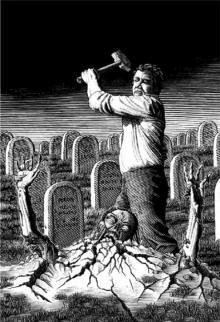 Dawn of the Dreadfuls
Dawn of the Dreadfuls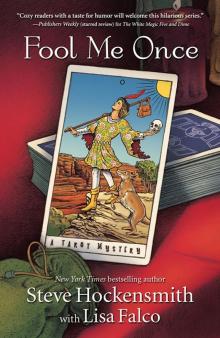 Fool Me Once: A Tarot Mystery
Fool Me Once: A Tarot Mystery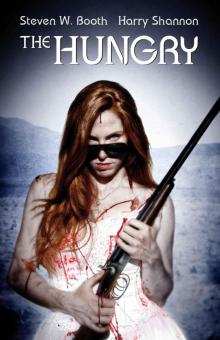 The Hungry
The Hungry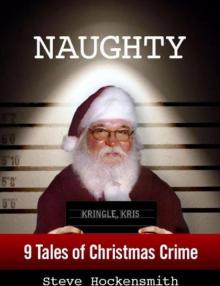 Naughty: Nine Tales of Christmas Crime
Naughty: Nine Tales of Christmas Crime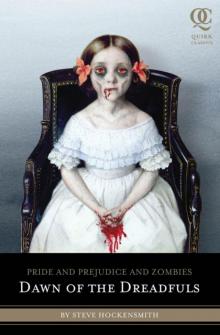 Pride and Prejudice and Zombies: Dawn of the Dreadfuls papaz-1
Pride and Prejudice and Zombies: Dawn of the Dreadfuls papaz-1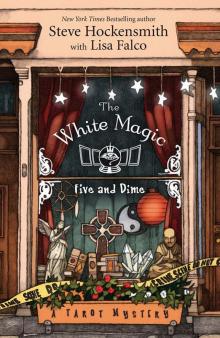 The White Magic Five & Dime (A Tarot Mystery)
The White Magic Five & Dime (A Tarot Mystery)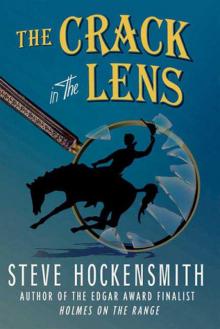 The Crack in the Lens
The Crack in the Lens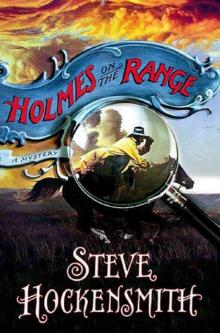 Holmes on the Range
Holmes on the Range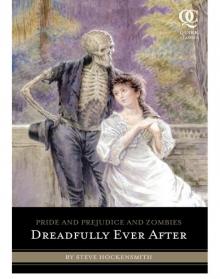 Dreadfully Ever After
Dreadfully Ever After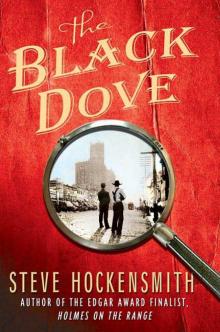 S Hockensmith - H03 - The Black Dove
S Hockensmith - H03 - The Black Dove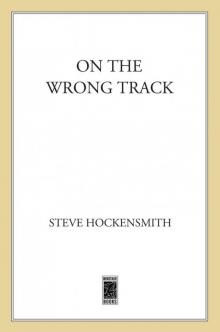 On the Wrong Track
On the Wrong Track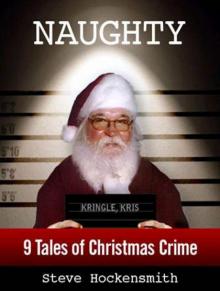 Naughty-Nine Tales of Christmas
Naughty-Nine Tales of Christmas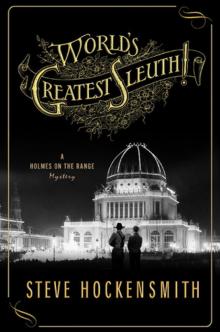 World's Greatest Sleuth!
World's Greatest Sleuth!